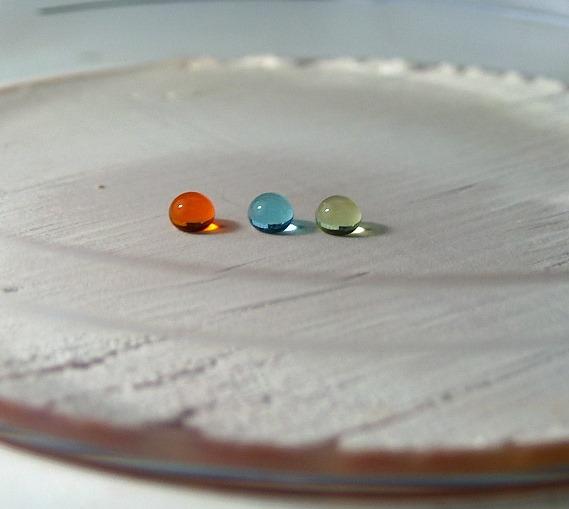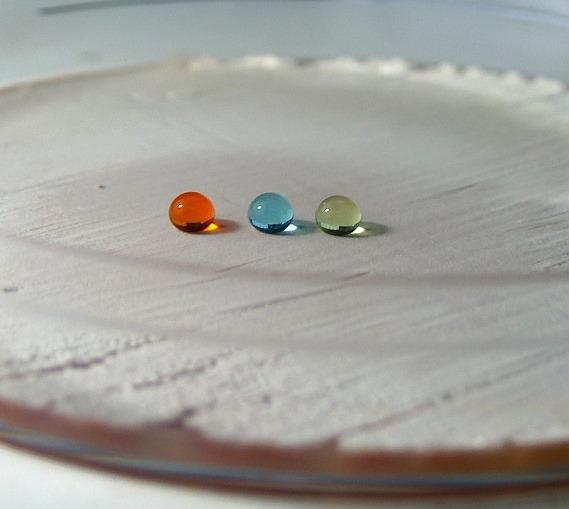
The cell surface of a common soil bacteria (Streptomyces sp.) is not only hydrophobic but it protects the organism from desiccation and therefore the movement of water across the cell…
Credit: Swansea University
6 June 2017 How soil bacteria can protect against corrosion – award for Swansea steel expert in worldwide competition
A Swansea University researcher, Alex Harold, has beaten over 5000 applicants to win an international award for her work using proteins derived from soil bacteria to develop a new anti-corrosion coating for steel.
Organised by Tata Group, the Tata Innovista competition highlights and rewards innovation within research and development, right across Tata's activity. This meant Alex's entry was up against projects from divisions such as Tata Steel Europe, Jaguar Landrover and Tata Global Beverages.
Of the 5000 entries, 51 teams were shortlisted and represented at the final in Mumbai. Alex's project was announced as the winner of the "Dare to Try" award, one of the twelve categories in the competition. Alex is a TATA Steel UK engineering doctorate student at Swansea University.
Her winning project was called 'Superhydrophobic Coatings from Bacterial Proteins'. A material that is "hydrophobic" is one that repels water – in effect, waterproof. The cells of a common soil bacteria have hydrophobic properties, and Alex used these to develop her new coating.
Dr Alex Harold explained the research behind her winning project:
"We wanted to try a coating that wasn't just inspired by nature but utilised biological components to provide a solution to an industrial problem. The cell surface of a common soil bacteria (Streptomyces sp.) is not only hydrophobic but it protects the organism from desiccation and therefore the movement of water across the cell barrier.
We extracted this biomaterial and dissolved it to create a protein solution that would self-assemble along hydrophobic / hydrophilic interfaces. Using this property, we were able to coat steel products and produce a robust protein coating that was less than 10 nanometres thick, able to withstand boiling and freezing and to reduce the potential for corrosion".
Protecting against corrosion is essential in the steel industry, which manufactures high-quality products used in sectors such as construction, packaging, aerospace and aircraft, and the car industry.
The new coating can provide a more environmentally-friendly alternative to the coatings currently used, without any loss in performance.
Alex's award is the latest example of Swansea University's expertise in steel-related research. It also illustrates the close partnership between the University and Tata, including the engineering doctorate which produces highly-skilled graduates for the steel industry.
Dr Geertje van Keulen from the Institute of Life Science at the Swansea University Medical School , academic lead on the project, said:
"Alex has managed to develop an exciting, environmentally friendly and robust application for anti-corrosion for TATA Steel. Her work has enabled us to unlock other application studies: we have recently received two research funding awards from the Defence and Security Accelerator for further development of protein-based materials for the Defence sector."
Industrial supervisor Dr Jon Elvins added:
"The interdisciplinary aspect of the project has worked well, and delivered a novel concept for anticorrosion".
###
Notes to editors:
Swansea University is a world-class, research-led, dual campus university. The University was established in 1920 and was the first campus university in the UK. It currently offers around 350 undergraduate courses and 350 postgraduate courses to circa 20,000 undergraduate and postgraduate students.
The University's 46-acre Singleton Park Campus is located in beautiful parkland with views across Swansea Bay. The University's 65-acre science and innovation Bay Campus, which opened in September 2015, is located a few miles away on the eastern approach to the city. It has the distinction of having direct access to a beach and its own seafront promenade. Both campuses are close to the Gower Peninsula, the UK's first Area of Outstanding Natural Beauty.
Swansea is ranked the top university in Wales and is currently The Times and The Sunday Times 'Welsh University of the Year'. It is also ranked within the top 350 best universities in the world in the Times Higher Education World University rankings.
The results of the Research Excellence Framework (REF) 2014 showed the University has achieved its ambition to be a top 30 research University, soaring up the league table to 26th in the UK, with the 'biggest leap among research-intensive institutions' (Times Higher Education, December 2014) in the UK.
The University has ambitious expansion plans as it moves towards its centenary in 2020, as it continues to extend its global reach and realising its domestic and international ambitions.
Swansea University is a registered charity. No.1138342. Visit http://www.swansea.ac.uk
Contact details:
Kevin Sullivan, Public Relations Officer, Swansea University press office.
[email protected] Tel 44 1792 513 245
Follow us on Twitter: http://www.twitter.com/SwanseaUni
Find us on Facebook: http://www.facebook.com/swanseauniversity
Media Contact
Kevin Sullivan
[email protected]
@swanseauni
http://www.swansea.ac.uk/
############
Story Source: Materials provided by Scienmag





